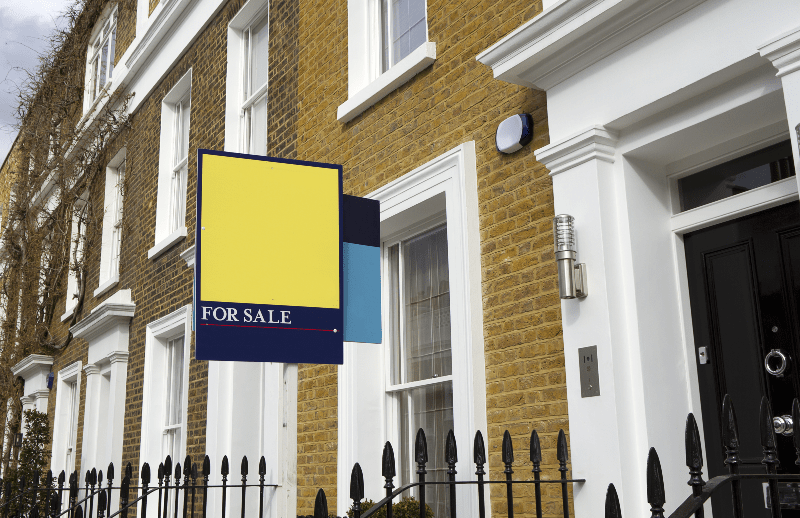
If you’ve recently lost a loved one, you may be dealing with a number of confusing legal and financial situations. One such situation may be the valuation and selling of their property. In this blog we aim to lessen the confusion and provide you with everything you need to know about probate and what happens if you sell the property for more or less than probate value. We’ll also explain whether or not you need probate in the first place.
So, can a house be sold for less than probate value? Yes, a house can be sold for less than probate value. In these circumstances, a refund in any overpayments of inheritance tax may be granted. If a house is sold for more than probate value, HMRC may get involved and issue higher inheritance taxes or capital gains tax.
Read on to learn more about valuing a house for probate and what happens if a property is sold for more or less than probative value.
What happens if a house sells for less than probate value?
Properties sold for less than their probative value may be entitled to a refund in any inheritance tax overpayment. However, this is not guaranteed and can only be claimed if the property is sold within four years of the deceased’s passing.
Currently, if a property is passed on to a direct descendant or a spouse (a child or grandchild), a nil-rate band applies. This means that inheritance up to the value of £500,000 can be passed down tax-free, or £1 million for a married couple. An additional residence nil-rate band may also apply to protect the family home from inheritance tax, up to £175,000.
What happens if you undervalue a property for probate?
If a property is undervalued for probate, HMRC can impose penalties and additional tax liabilities. It is important to ensure that probate valuations are reported accurately as any discrepancies are likely to be investigated.
If a professional valuer was used to determine probate value, the estate’s representatives or family will be protected from liability from such penalties. However, for the valuer, there are different levels of penalties depending on the inaccuracies of reporting:
-
- If the error is due to lack of reasonable care, the penalty will be between 0% and 30% of the extra tax due;
-
- If the error is deliberate, the penalty will be between 20% and 70% of the extra tax due;
-
- If the error is deliberate and concealed, the penalty will be between 30% and 100% of the extra tax due.
What happens if you sell a property for more than probate value?
If, for whatever reason, the final sale price is higher than probate value the following can occur:
-
- HMRC may increase the inheritance tax owed. This can be challenged via the District Valuer, but is often a time-consuming and stressful process.
-
- You could be liable for capital gains tax.
Can a house be sold without probate?
You cannot sell a house without probate. You have no legal authorisation to sell a property until probate is granted, unless your name is already on the title deeds; for example, in the case of a spouse.
You can go ahead and put the property up for sale and even accept offers before probate is granted, however, you cannot complete the sale until you receive probate.
Doing so may create a range of financial issues in relation to inheritance tax, probate fees, maintenance costs and more, all of which can be reclaimed from the cost of the estate upon sale.
What’s the difference between probate value and market value?
Generally speaking, probate value is the value of an estate as determined by HMRC guidelines. It typically includes everything the person owned at the time of their death, minus any debts owed. This will usually include their property(ies). Market value is the value that an asset may expect to sell for on the open market, i.e. by an estate agent.
Learn more about this in our detailed blog, What is the difference between market value and probate value?, where we go into more detail about each type of valuation and when they should be used.
How to arrange a probate valuation
It’s best to contact a specialist probate surveyor to ensure that the correct value of the property is determined. At Crest Surveyors, we understand that every property is different and unique. Calculating someone’s assets for probate may be confusing and overwhelming, especially if the property they owned is a large estate, a grade listed building, if they owned a business property alongside their commercial property, or more.
To help you during this difficult process, Crest Surveyors are here to provide a thorough ‘Red Book’ valuation. This is a more formal and in-depth valuation that provides photographic evidence, a thorough written report, and a valuation that is as accurate as possible.
Get in touch today for more information or to arrange a valuation.
FAQs
How does probate work?
In relation to properties, a RICS chartered surveyor will calculate the value of the property in question to determine its market value – what it might reasonably sell for on the open market. Other areas of the deceased’s estate may require other specialist valuation methods.
How long does probate take?
A probate valuation will usually take anywhere from 30 minutes to a couple of hours, depending on the size of the property and any particularities associated with the property. Crest Chartered Surveyors aims to deliver all valuation reports within 6 working days of valuation.
Do you need probate if there is a will?
You will need to apply for a Grant of Probate if you are an Executor named in the deceased’s will. This process ensures that Executors are the right people to deal with the deceased’s estate and provides them with the legal right to deal with assets such as property, bank accounts and shares.
